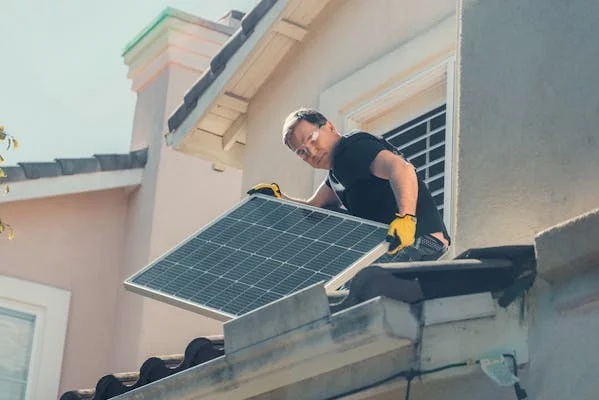A Brighter Tomorrow Starts Today
Imagine waking up to a world where your energy bills are slashed by half, and your home contributes to a cleaner planet. This dream can become a reality for homeowners and businesses in Boston, MA, through the adoption of solar energy. However, one question often looms large: how do you afford the initial costs of solar equipment? Luckily, a variety of financing options are available to make solar power more accessible than ever. In this guide, we’ll explore the financing options for solar equipment in Boston, including loans, leases, power purchase agreements (PPAs), tax incentives, and rebates, so you can make an informed decision for your energy future.
Why Solar Energy in Boston?
1. Environmental Benefits
Boston is committed to reducing greenhouse gas emissions, with ambitious targets outlined in the city’s Climate Action Plan. By installing solar panels, you not only lower your carbon footprint but also support Boston’s goal of becoming carbon-neutral by 2050.
2. Economic Savings
Massachusetts ranks as one of the top states for solar energy adoption due to its strong incentives and high electricity costs. Solar panels can reduce energy bills significantly, saving homeowners an average of $1,200 per year, according to the Solar Energy Industries Association (SEIA).
3. Increasing Property Value
Studies show that homes with solar panels sell 4.1% more than comparable homes without them. In a competitive housing market like Boston, this can be a major advantage.
Financing Options for Solar Equipment in Boston, MA
1. Solar Loans
Solar loans are one of the most popular financing methods for homeowners. These loans allow you to own your solar system outright while spreading the cost over manageable monthly payments.
Key Features:
- Ownership Benefits: You qualify for federal and state tax credits.
- Flexible Terms: Loan terms typically range from 5 to 20 years.
- Low Interest Rates: Many solar loans come with rates as low as 4.99%.
Top Providers:
- Mass Solar Loan Program: A Massachusetts-specific program offering low-interest loans with additional income-based incentives.
- National Banks and Credit Unions: Institutions like Light Stream and Mosaic specialize in solar financing.
2. Solar Leases
If you’re not ready to commit to owning a solar system, a solar lease could be a great alternative. With this option, a solar provider installs and owns the system, while you pay a fixed monthly fee to use the energy it generates.
Pros:
- No Upfront Costs: Start saving immediately without a significant investment.
- Maintenance Included: The provider handles system maintenance and repairs.
Cons:
- No Ownership Benefits: You won’t qualify for tax credits or incentives.
- Fixed Payments: Monthly fees may not decrease over time.
3. Power Purchase Agreements (PPAs)
Similar to leases, PPAs involve a third party owning the solar system. However, instead of a fixed monthly fee, you pay for the energy the system produces at a predetermined rate, often lower than local utility rates.
Advantages:
- Cost Savings: Lower energy costs without owning the system.
- No Upfront Costs: Start using solar power immediately.
Disadvantages:
- No Tax Incentives: These remain with the system owner.
- Long-Term Contracts: Typically 20 years, which may limit future flexibility.
Incentives and Rebates in Massachusetts
1. Federal Tax Credit
The Investment Tax Credit (ITC) allows you to deduct 30% of your solar installation costs from your federal taxes. This incentive applies to both residential and commercial installations.
2. Massachusetts-Specific Incentives
- SMART Program: The Solar Massachusetts Renewable Target (SMART) program offers incentives based on the amount of solar energy your system generates.
- Mass Solar Loan Program: Provides low-interest financing options for Massachusetts residents.
- Sales Tax Exemption: Solar equipment is exempt from Massachusetts state sales tax.
- Property Tax Exemption: Solar installations are exempt from increased property taxes for up to 20 years.
Steps to Secure Solar Financing in Boston
1. Assess Your Energy Needs
Conduct a home energy audit to determine your current consumption and potential solar capacity.
2. Research Installers and Financing Options
Compare local solar companies in Boston and explore financing of solar equip/boston ma options they offer.
3. Apply for Incentives
Work with your installer to apply for federal and state incentives, including the ITC and SMART program.
4. Secure Financing
Choose between a loan, lease, or PPA based on your financial situation and long-term goals.
5. Monitor and Maintain
Once installed, regularly monitor your solar system’s performance to maximize its benefits.
Comparing Financing Options: A Quick Overview
| Financing Option | Upfront Cost | Ownership | Incentives Eligible | Maintenance Responsibility |
|---|---|---|---|---|
| Solar Loans | Low | Yes | Yes | Owner |
| Solar Leases | None | No | No | Provider |
| Power Purchase Agreements (PPAs) | None | No | No | Provider |
Conclusion: Powering Boston’s Future
Solar energy is not just a trend; it’s a transformative way to reduce costs and contribute to a sustainable future. With various financing options tailored to different needs, Boston residents can easily join the renewable energy revolution. Are you ready to make the switch and brighten your future?
Frequently Asked Questions
Q: How long does it take for solar panels to pay for themselves?
The average payback period for solar panels in Massachusetts is 6 to 8 years, thanks to strong incentives and high energy savings.
Q: Can I finance solar panels with bad credit?
Yes, some programs, such as the Mass Solar Loan, offer options for individuals with less-than-perfect credit. financing of solar equip/boston ma.
Q: Are there any upfront costs with solar leases or PPAs?
No, both options require no initial investment, making them attractive for budget-conscious homeowners. financing of solar equip/boston ma





